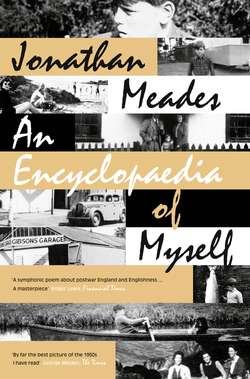Читать книгу An Encyclopaedia of Myself - Jonathan Meades, Jonathan Meades - Страница 12
BARNETT, MISS
ОглавлениеThe far-distant end of Britford Lane where the rutted, puddled, cindered road ended. From there on the route to the watery village of Britford was a narrow footpath bordered by a thorny hedge and, on its other side, a barbed wire fence. Beyond the field that way, unseen, signalled by a suspended mist strip, ran Navigation Straight. A gilded copperplate signboard on legs in its garden announced that Britford Lane’s penultimate building, a pebbledash chalet-bungalow, was a school, a sort of dame school, my first school. The single classroom occupied most of the ground floor. Its ceiling was impressively high; all ceilings were impressively high in comparison with my home’s. I had never seen such a bright room, I had never seen such light before. The end onto the back garden was entirely glazed. Late in the morning it admitted stout rods of sunlight dense with churning motes which vanished when I went to stroke them. Where did they go? To the garden where stooped the vestiges of an orchard, withered plum trees that no longer bore fruit? To the lane behind where wooden sheds and ad hoc garages teetered and rotted? On the third day of term we were instructed to paint these barren trees with our watercolours. I made some sploshes on a sheet of paper then drank the muddy water from the jar in which we cleaned our brushes. It tasted interesting. I drank more. A fellow pupil grassed me up to Miss Barnett, a spinster in pince-nez which caught the sun. They heliographed a virgin’s hatred of life. She marched to my desk and hissed. She told me that I was not just stupid to have drunk the water, she said that I would die, that I deserved to die. But that I was not to die at school. Her assistant teacher, a young woman in plaid, drove me home in her van so that I might die in my own bed. The alarmed German Girl ran up the road to my mother’s classroom to fetch her. I waited anxiously. I hoped to see my mother before I died. Until the moment when I had to retire to my deathbed I waited for her on the dining-room window seat. The assistant teacher paced between the van and the front door, smoking. I wondered how to check for symptoms. How would I know when I was dead? Was transport to heaven immediate? What form did it take? If handsomely liveried tourist coaches were used I prayed that the vehicle would not be a wheezy Bedford which might fail to climb the slopes but a sleek Guy with a cast-metal Red Indian’s head above the radiator: I prided myself on being able to distinguish lorries by the sound of their engine. I could tell a handsome Foden (those crazy radiator grilles!) from a Dennis (locally tested, in skeletal form, no cab, no bonnet, all working parts revealed as though the driver was driving an exploded drawing). I craned my neck for a sight of my mother. Had I been a good son? Then my mother was hugging me, telling me I wasn’t going to die, wiping the tears I had thitherto been too numb to shed, getting The German Girl to make me cocoa. She comforted me so long that my fear abated. Then she went outside, out of my hearing, to talk to the assistant teacher. I had never seen her gesture before, never seen her shake her head that way. She was berating the young woman whose expression was increasingly sheepish. Whatever was said was presumably mild beside what was said to Miss Barnett herself later that day. That was the end of that school. I did not enquire whether I was expelled or withdrawn.
